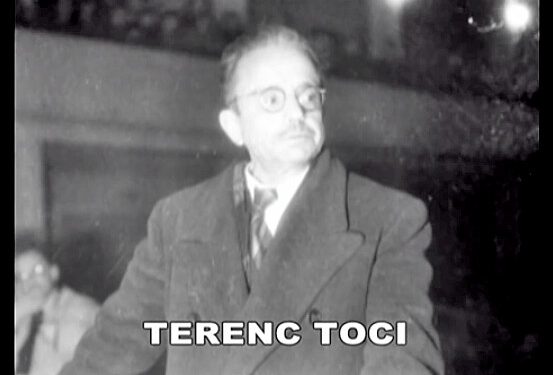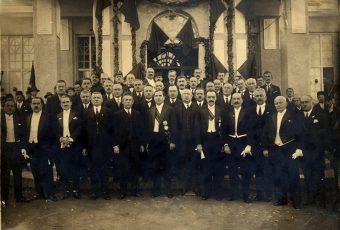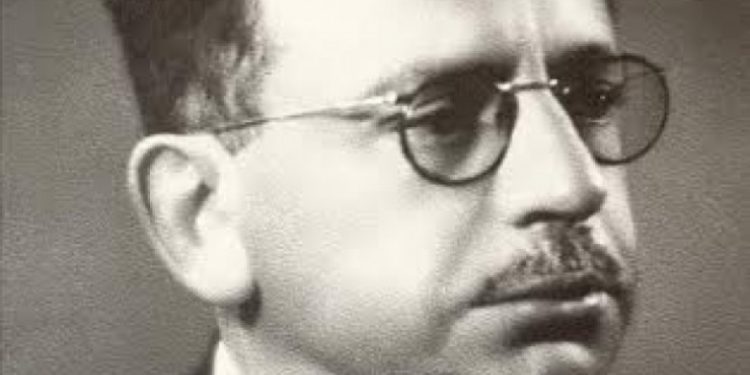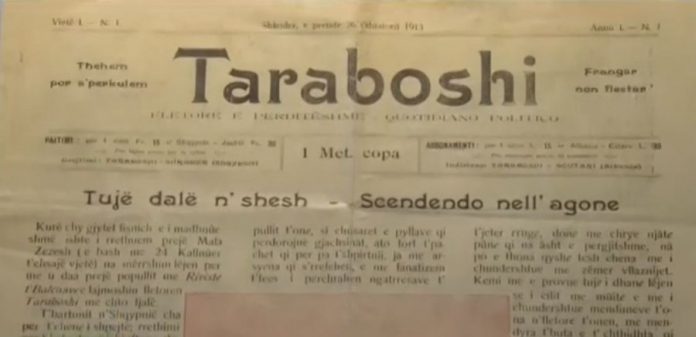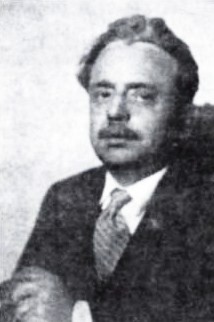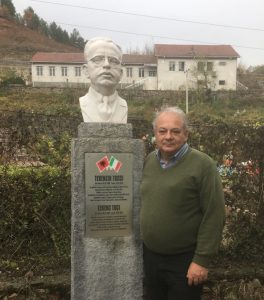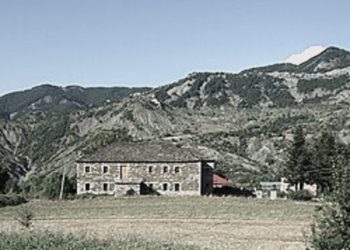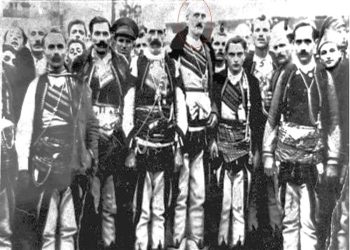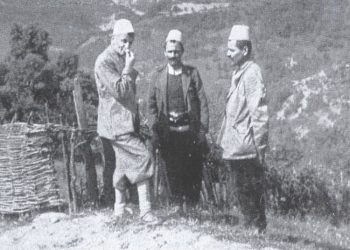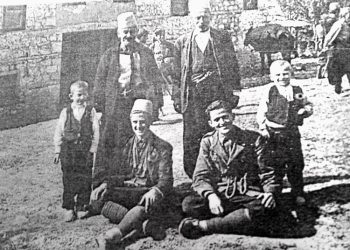By Terenzio D’Alena
Translated by Agim Zeka
Terenc Toçi (1880 – 1945) controversial lawyer and writer. In 1911 he organized and led the Albanian revolutionary movement in the mountains of Shkodra. He founded the newspaper “Taraboshi” (1913), the first political daily in Albania. Prefect (1921), Secretary General of the Presidency of the Republic (1927), Minister of National Economy (1937), President of the Chamber of Deputies (1940). He was still alive when Gaetano Petrotta wrote in the volume “Albanian people, language and literature”: “As a politician, as a functionary, as a lawyer, as a writer, as a patriot, Toçi is one of the most prominent Albanian figures”. Shot by the Communists on April 14, 1945.
It was determined to preserve and use the Albanian language in administrative acts and to preserve traditional holiday ceremonies that showed national identity.
He was also against the war, but he was comforted by the realization of the centuries-old aspiration of territorial union with Chameria. He met Mussolini in Rome, who seemed a tired and disappointed man …
Albania is the “land of eagles”. A troubled land that opens, rises, closes, and is swept away by torrents that flow into the Adriatic Sea. The Albanian has always “fought” with this fertile land and swampy places, he has fought against the like, deeply connected with unclear nationalisms. Forged by the quality of the motherland, which has influenced the character and tradition of this people, the Albanians, with pride, have established clan relations, through the use of honesty to the “faith”, the word given and the “canon”, the unwritten code of indirect and masculine revenge, adapting everything to the Byzantine tradition and hostile to the cloud. Visigoths, I, Ostrogoths, Slavs, Bulgarians, Normans conquered and destroyed Europe from the V-XI century. The descendants of the Pelasgians encountered on their way numerous fanatical crusades, before establishing a stable relationship with Venice. And this population, with an Indo-European language, distinctive on the continent, tortured by ancient fratricidal wars, trained through numerous battles, was cemented by the proud spirit of independence for the conception of an ancient nation.
In this context came Gjergj Kastrioti – Skënderbeu, the absolute national glory, “the general captain of Albania”, at the dawn of the centuries-long war against the Turks, who did not allow the country of eagles to become a state until the early 1900s. It was a period of great geo-ethnic interests for the mass emigration of Albanians to Calabria and eastern Sicily, where they found a land similar to the one, they left, capable of alleviating nostalgia and where they created lasting traces even today, or linguistic minorities in Ethnographic “islands”, already known.
In one of these “islands”, in 1880, was born Terenc Toçi, a human being composed of natural love for the Italian land, which gave him stability and what genetically endowed him with outstanding characteristics of the Albanian character. His life was conceived in the shadows of the olive trees and citrus of Calabria, where the green spaces and hills, with their serenity, intertwined in the troubled consciousness the gentle impulsivity and spiritual purity, with the sincere and idealistic faith.
Reading at a young age the poems of Jeronim de Rada, the Arbëresh who lived during the Italian Renaissance and an ardent supporter of Albanian independence, warmed the heart of Terenc Toçi. He studied law at the University of Urbino and, in 1904, began his legal activity in Rome, where he also worked as editor-in-chief of the periodical press dealing with Balkan issues. He traveled to meet the Albanian diaspora around the world, listening to their requests in Argentina and the USA.
In 1911 he finally settled in Albania and formed in Shkodra the first interim government with other patriots who came from Italy, gathering the heads of the tribes of Mirdita and the North and raised the national flag for the first time. He was unanimously hailed as president and, despite the large sum given for his capture, none of the more than 60,000 armed highlanders, proud and honored by tradition, betrayed him. In Shkodra he created the first Albanian newspaper “Taraboshi”, which was closed after a few months by the international government. The denunciation of Austrian intentions for the country was sensational, as was the disappointment at the non-intervention promised by Ricciotti Garibaldi.
It is worth remembering that in those years, after the Turkish occupation, an international coalition, with troops from various European countries (France, Serbia, Italy, Greece), temporarily ruled the country. In addition, Italy’s victory in the war against Turkey marked the final fall of the Ottoman Empire and gave impetus to the Albanian war, so the patriot Ismail Qemali raised the Albanian flag in Vlora and formed the interim government. But one day in 1913, suddenly the Italian consulate in Shkodra expelled without warning the family of Terenc Toçi, who was forced to stay in his house in S. Cosmo Albanese for 4 years.
In 1917, summoned under arms, he set out for the war front. In 1920 he returned to Albania with the mediation of Minister Giolitti and in 1921 he was appointed prefect of Korça, where he also ran a fortnightly magazine. In 1926 he wrote “Criminal Law”, a basic work for Albanian justice and participated in the drafting of the civil code promoted by Zanardelli. He also participates in the drafting of the commercial code, as well as publishes an Albanian and an Italian grammar. Toçi’s literary production was great and this is evidenced by the library he left after his death, already cataloged in the State Archive in Tirana. During this time, he held a number of important institutional tasks and supported the achievement of Italian technicians.
After 1925 the provisional governments ended and Zogu became president and then king with the consent of the government, but not that of Toçi who was an ardent Republican. Meanwhile, he was fighting for the friendship between Italy and Albania, despite the anti-Italian tendency of many ministers and the efforts of Italy, denounced by him, for the partial exploitation of the Albanian economy. All this was considered an act of betrayal of Toçi during the terrible days of the trial against him, in 1945.
In 1938 he was appointed Minister of National Economy and accepted the position of President of the Joint High Council after the Italian occupation in 1939. He was determined to preserve the use of the Albanian language in administrative acts and to preserve the traditional holiday ceremonies that showed national identity. He was also against the war, but was comforted by the realization of the centuries-old aspiration of territorial union with Chameria. He met Mussolini in Rome, who seemed to him a tired and disappointed man. On September 10, 1943, the Germans arrived in Tirana, but the new government issued a decree protecting the Italian-Albanians. German troops left Tirana on November 17, 1944, leaving only one soldier locked in a bunker in Skanderbeg Square with a large quantity of ammunition.
He stayed with the partisans for 36 hours and, after running out of ammunition, killed himself for not surrendering to the partisans. On the same day, Terenc Toçi, although he had been the target of a new arrest and, despite the advice of some friends to leave, was detained and sent to a terrible prison along with other prisoners. But more meaningless was the charge as a war criminal! The farce process took place in secret and under the direction of the Serbo-Montenegrin leaders, on whom Enver Hoxha’s party depended. Unfortunately, many leaders of the “ballistae” were involved in this process, with whom the “victorious” communists left their accounts.
Of Toçi’s four daughters, only the youngest and her mother stayed in Tirana. They were looted and forcibly evicted from the house. With much effort they managed to meet their beloved man, after hours and hours of queuing in front of the prison bars, along with many unfortunate relatives of other innocent prisoners. A loudspeaker outside the “Savoja” cinema, turned into a courtroom, spread the voices of the protagonists of the farce process, including that of lawyer Toçi who lectured while defending himself in the absence of a defense lawyer.
A summary of the debate made during the process can be found in the book “Terenc Toçi, my father”, written by his daughter, Rita. On April 14, 1945, many citizens saw the discovered truck crossing the streets of Tirana, loaded with the first 17 innocent people sentenced to be shot. Professionals, intellectuals, patriots. Tied two by two, shot and raped, they were thrown into a garbage dump at an unknown location. They even refused to turn their backs on the executioners, but stood with their chests forward. They were “buried” without a grave, without a cross, without flowers …
World War II was over, and the era of foretold barbarism, dictatorship, isolation, a real tragedy that would last nearly half a century and sentence millions of innocent people began for the tortured country. It was even the end of a man who, like many others, always fought with invincible courage and passion, until he gave his life for the achievement of a political and social harmony, which was marked late in the chronometer of history. And this moreover if one takes into account the time when such a thing happened, to understand the existence of the pure idealism of this man. The hope that a similar tragedy should not have happened in vain adds to the love of his relatives and sympathizers, as well as the author of these lines, his nephew, despite the fact that we never knew him. But, even today, surprisingly, the Albanian state, despite repeated requests, has not recognized the status of political persecuted, the figure of Terenc Toçi./Memorie.al




